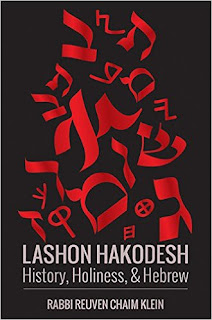Afterlife: The Jewish View
Jonathan Morgenstern with Rabbi Sholom Kamenetsky
Mosaica Press / 102 pp.
There is no one who doesn’t ponder what happens to them when
life comes to an end. What is the afterlife like? What is the Messianic Era all
about? What will it be like when we are resurrected and brought back to this
world?
Jonathan Morgenstern has done a tremendous service explaining
the normative[1]
Jewish view of what happens to us after we die. The Afterlife is an
exceptionally clear and easy to read presentation of all the relevant issues
such as, the purpose of life, what happens when we die, reincarnation[2],
resurrection, the Messianic era, the world to come, and more. Analogies are a prominent
tool in making the concepts more understandable.
Here’s an excerpt:
When we hear the term
“reincarnation,” we naturally thinks that upon death, the person’s soul – in
its entirety - comes back to earth for another life; albeit in a different
body.
This is a misconception. A person – meaning one individual’s
consciousness – is unique. He has but
one chance at life. That is why Judaism
considers life so precious. Yet,
reincarnation is indeed about the spirit returning to this world in another
physical form.
According to Jewish teachings,
reincarnation is not the returning of one’s entire soul to another body or
another form. Instead, what gets
reincarnated is only the part of a person’s soul – the part that has not
completed its mission. Therefore, it is not really accurate to say that a
person gets reincarnated or a person’s soul gets reincarnated.
The part of a person’s soul that has achieved its mission moves on to its next residence in the World of Souls and what follows. This completed portion of soul remains as that person’s unique identity for eternity. The portion of that person’s soul which did not complete its mission is what becomes subject to reincarnation. This incomplete portion of soul is placed inside another body and becomes an entirely new person with a new consciousness. This new person is not the same as the first person. The first person has lost his or her opportunity to perfect that part of his soul which was formerly part of him. The knowledge of this lost opportunity is part of the remorse one experiences in the next world.
Although the reincarnated portion
of one’s soul is no longer part of that person and his or her unique identity,
there will be a closer affinity between them and they will recognize each other
in the next world. This is similar to
how we have an affinity with our family members, but exist as separate
people.
The Afterlife is a job well done, making it an important and
worthwhile work. It is perfect for secular Jews, ba’alei teshuva, and those
with otherwise limited backgrounds in Torah learning. It can also come in handy
for those who work in kiruv and might want some ideas and assistance on how to
teach these concepts. It is also appropriate for non-Jews who may want to know
about the Jewish view on the afterlife and related issues.
To order the book: http://www.amazon.com/Afterlife-Jewish-View-Jonathan-Morgenstern/dp/1937887251
To order the book: http://www.amazon.com/Afterlife-Jewish-View-Jonathan-Morgenstern/dp/1937887251
[1] There is one sentence in the book that I feel is not
reflective of the normative Jewish view. On p. 67 it is written that the
Gehenom experience can last between "one second and one year" whereas
the normative view is that it lasts for 11 or 12 months. I asked Rav Kamenetsky
about this who kindly responded quickly with a slew of sources. While these
sources can be interpreted as supporting this approach (I managed to
look up some, but not all of the sources he sent me), as mentioned, it is not
the dominant view, in my opinion. That being said, there is little certainty in
all such matters. No one has ever been there and back to tell us what the Gehenom
experience was like. See next footnote for another example of a dissenting
opinion in an otherwise normative view.
[2] Although
Morgenstern presents the normative Jewish view on all such matters, there are
some lesser known opposing views on these issues. To name but one example,
while reincarnation is indeed a normative Jewish belief, which Morgenstern presents
in an exceptionally clear and easy to understand manner, it is interesting to
note that there were great sages who completely rejected the concept. This list includes
the likes of Rav Saadia Gaon, Rav Leon Medina, Rav David Kimchi, and Rav Joseph
Albo, among many others. It was likely the influence of the Arizal that made
reincarnation so universally accepted today. (R. Avraham Trugman, in his book
on reincarnation “Return Again,” argues that we’ve misunderstood Saadia’s true
position, and that Saadia would accept the concept of reincarnation as we’ve
come to understand it.). For alternative views on the subject of resurrection see Marc B. Shapiro, "The Limits of Orthodox Theology," p. 149-156


